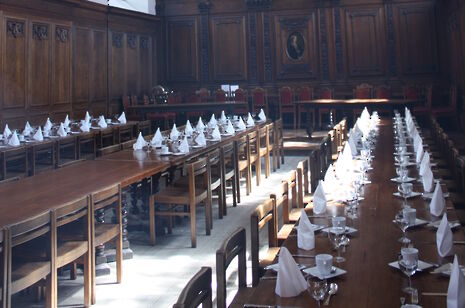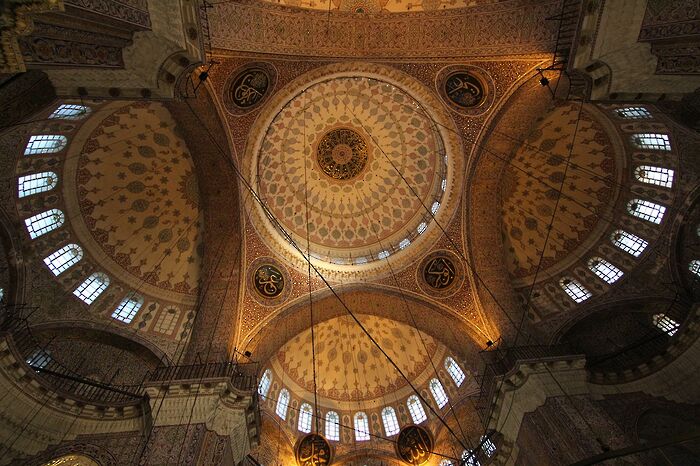Becoming BME: a view from the Minority Ethnic mega-formal at Clare
“I have hope for Cambridge… but Cambridge must continue to do the work it has only just started”, writes Tanvi Roberts

I don’t know if I ever identified myself as ‘BME’ before I came to Cambridge. I still don’t know if I do. Of course, I feel (and am) Indian. I am also Northern Irish, having lived there from the age of nine months.
According to the 2011 census, the non-white population of Northern Ireland is just 1.79%; this is in comparison to the 14% of England and Wales that is not white. But my experiences of racism in Belfast were thankfully few. Thanks to privileges such as an education at schools with a high minority ethnic contingent, the educational background of my parents, and the fact that English is my first language, I rarely felt out of place.
I expected to feel even less out of place at Cambridge, despite all I’d heard of its racism. In the 90s, my parents moved from India to Cambridge for my dad to do a PhD in English literature at Magdalene. I had long heard their stories of Cambridge racism.
Due to her brightly-coloured saris and fresh bindis every day, many assumed that my mother didn’t speak English, despite her MA in the subject. When she worked as a lab assistant and at Tesco’s, she was routinely excluded from social occasions and blamed for mistakes others made.
“As an individual in Cambridge, I had rarely been made to feel othered. But on that Thursday night in Cambridge, there was something threatening about a group of BME people talking about BME issues.”
Of course, this is not all they experienced. They also met many kind, warm, and open individuals who are now some of their closest friends. My mum looks back to her days in Cambridge with affection, from the discovery of her passion for English gardens to the revelation that she could eat mince pies (SPOILER ALERT: they do not actually contain meat. Tell a friend! Save a life!). But behind their positive experiences was the undeniable tinge of racism.
I thought things had changed. Of course, the Cambridge of the 90s was a different place from Cambridge today in many respects. But my experience at a BME mega-formal last Thursday made clear to me just how far we have yet to go.
The formal was my first BME event at Cambridge. During my first year, I had ducked out of BME events at the last minute. At some level, I was worried that I would not be BME enough. On the one hand, I have a home in India. The food I fantasize about when I’m sick or tired is Indian.
My childhood summers were spent gorging myself on pedas (an Indian milk sweet), courtesy of my grandfather’s indulgence; galumphing around my grandparents’ compound to find touch-me-nots as their old dog ran away from me; and swelling to around twice my normal size with mosquito bites, like Roald Dahl’s champion gum-chewer Violet.
But I have lived in the UK all my life. I have a distinctly Northern Irish accent, and I know no Indian languages. On occasion, I have been known to weep and gnash my teeth after a medium-spiced Nando’s.
“It feels like a reminder that despite how hard we work, how much we love some parts of Cambridge, how much we feel we belong here, others do not feel the same.”
I thought the BME mega-formal, however, was the ideal introduction to the Cambridge BME community. It was hosted at my own college (Clare) and I had a number of friends going already. Scheduled before the formal were a series of mini-talks from inspiring BME Cambridge figures. One was Dr Manali Desai, a distinguished professor of Sociology; another, Bilal Khan, a Cambridge alumnus who now works on social justice issues; and the third was the leader of the Black Cantabs Society, Surer Mohamed.
The group who had booked the room after us was the university Heraldry Society (CUHAGS). Heraldry is the study of coats of arms, whether of family or university. Just as our last speaker was finishing her presentation, they knocked loudly on the door and saw the event inside. Instead of quietly raising the issue with our BME officer, they proceeded to enter the room and talk loudly over the presentation while putting on their gowns. We had just finished listening to a speech on micro-aggressions for BME people. It was a moment of comic, if unfortunate, irony.
On to the formal, then. Buzzing with the speakers’ ideas, the excitement to meet each other, and not least our hunger for that reliable bread roll, we made our way to the Great Hall. Two tables were reserved for us; the other, for the Heraldry society. The room was effectively segregated.
Then, a member of the Clare catering staff came into the formal just before it started and addressed, specifically, the BME tables. ‘We just want to make sure you’re aware of the rules of a formal hall in Cambridge,’ he said. ‘You are not allowed to leave the hall to go to the toilet.’ A sea of mostly non-white faces looked back at the white man in disbelief. There were a few shocked giggles; the girl opposite me shook her head.
Meanwhile, the Heraldry society continued with its noisy merriments; they faced no such friendly reminders of Cambridge etiquette. As I looked around our BME tables, I realised that I couldn’t see anyone who wasn’t wearing a gown, that unmistakeable mark of Cambridge studentship. And I realised too that I had been to countless formals in my time here: not once before had these reminders seemed necessary.
“The burden, emotional and otherwise, of talking about racism falls upon those who experience it in the first place.”
The dinner itself was lovely. Conversation ranged from friends’ daddy issues (‘college, and otherwise’) to the way some strangers like to plunge their hands into my thick, curly hair (at your own peril be it, my friends: I only wash it once a week and I doubt you’ll be able to get your hands out again). Afterwards, as is customary, our BME officer stood up to briefly thank us for our attendance and invite us to the bar. She clinked her glass, elegantly. She clinked her glass again. All four surrounding her began to clink their glasses too. I let out a bellow and a single hearty clap.
Still the Heraldry society continued with its noisy merriments (these guys – and yes, they were all guys – are clearly where the party’s at). As she began to speak, they continued shouting over her. ‘Make it quick!’ one of them yelled. ‘Hurry up!’ said another. I issued a high-pitched scream, which I cleverly disguised as a cheer for our beleaguered BME officer. I had never felt more BME than I did at that moment: not because of how I saw myself, but how I felt others were seeing me.
As an individual in Cambridge, I had rarely been made to feel othered. But on that Thursday night in Cambridge, there was something threatening about a group of BME people talking about BME issues. We were spoken over and shushed, unnecessarily reminded of basic Cambridge etiquette. These issues do seem small. That’s why they are called micro-aggressions, after all. But cumulatively they were a sign of how some at Cambridge are liable to view non-white groups.
Not only are we largely unrepresented in portraiture, statues, and other media (a gap the Black Cantabs exhibition has done well to challenge); we are also subtly pushed out of the spaces we have worked hard to create. It feels like a reminder that despite how hard we work, how much we love some parts of Cambridge, how much we feel we belong here, others do not feel the same.
And what’s more is that sometimes these small incidents cannot be conclusively linked to racism. It’s not like a racial slur flung at you on the street, though I’ve had that too. It’s a strange feeling at the pit of your stomach which makes you run through your memories of Cambridge and wonder: is that what other people see of me? Is that their first impression?
And as I write this, I delay writing my last essay due this term, translating my last passage of Latin, or even just sitting in my bed binge-watching Fleabag. The burden, emotional and otherwise, of talking about racism falls upon those who experience it in the first place.
I have hope for Cambridge. Like my parents, I have met people whom I want to be friends with in thirty years. But Cambridge must continue to do the work it has only just started. In 1209, this space was not built for all of us. In 2019, it must be.
Responding to Varsity's request for comment regarding the incident discussed in this article, The President and Committee of CUHAGS said: “CUHAGS meets on a regular basis at Clare for its speaker meetings, and has done for many years. We have long combined our meetings with dinner beforehand for those who book in. Never before have any such complaints regarding conduct at dinner been made, and I have to say that this does not sound like behaviour I would expect from members of CUHAGS. On this occasion, it should be noted, CUHAGS did not have a table to itself, but shared with two other parties. Regarding the room booking, we did allow the previous event to stay in the room until shortly after 7pm, and we extended to the organisers the same courtesy we would to any other university society. CUHAGS room bookings have for many years been from 6.30pm onwards and we were waiting outside the room for half an hour as witnesses will attest. We did not enter the room noisily, did not get in the way, and did so after 7pm. All I can say is I am sorry no one from the group had the courtesy to approach CUHAGS with any complaints, either on the evening in question, or in the weeks since then; this is the first we have heard from them, albeit via the student press.”
Clare College's catering team did not respond to Varsity's request for comment.
 News / Cambridge academics stand out in King’s 2026 Honours List2 January 2026
News / Cambridge academics stand out in King’s 2026 Honours List2 January 2026 Interviews / You don’t need to peak at Cambridge, says Robin Harding31 December 2025
Interviews / You don’t need to peak at Cambridge, says Robin Harding31 December 2025 Comment / What happened to men at Cambridge?31 December 2025
Comment / What happened to men at Cambridge?31 December 2025 Features / “It’s a momentary expression of rage”: reforming democracy from Cambridge4 January 2026
Features / “It’s a momentary expression of rage”: reforming democracy from Cambridge4 January 2026 News / AstraZeneca sues for £32 million over faulty construction at Cambridge Campus31 December 2025
News / AstraZeneca sues for £32 million over faulty construction at Cambridge Campus31 December 2025










